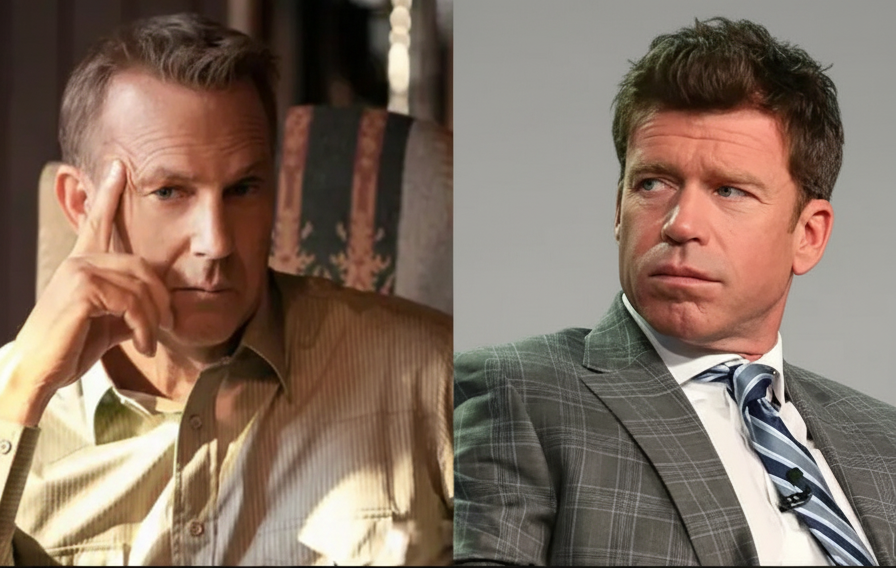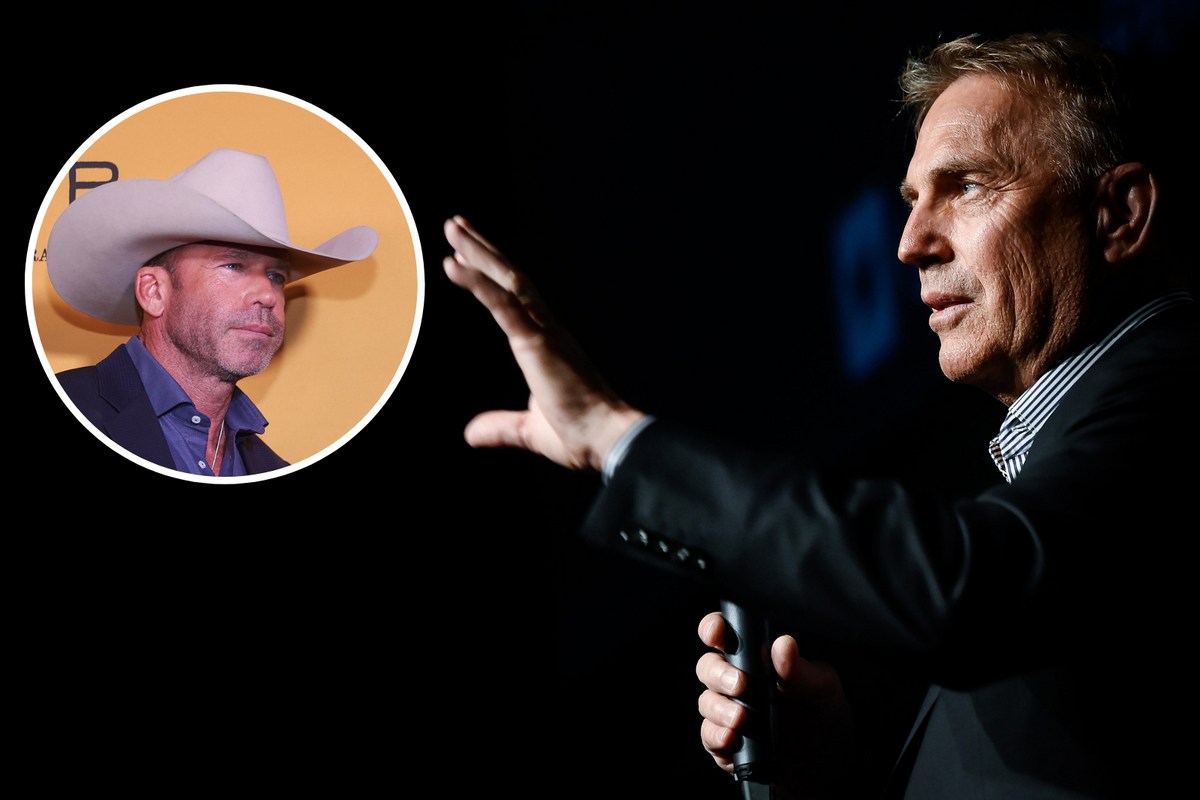
SPOILER ALERT: This post contains spoilers from the Season 5, Episode 11 episode of Yellowstone, titled “Three Fifty-Three,” which premiered Sunday, Nov. 24 on Paramount Network.
When it became evident that Kevin Costner would not return for the latter half of Yellowstone’s fifth season, fans were left speculating about how creator Taylor Sheridan would handle the exit of Costner’s character, John Dutton, a central figure in the series. The departure was marked by tension, with Costner revealing challenges in aligning with the production team on filming schedules, and he even hinted at the possibility of legal action stemming from the contentious circumstances surrounding his exit from the show.

It’s difficult to fathom that fans could have anticipated the abrupt and controversial manner in which John Dutton, the patriarch of the Dutton family, was written out of Yellowstone. Rather than crafting a respectful and meaningful farewell befitting the central character’s towering presence, creator Taylor Sheridan appears to have deliberately tarnished John’s in-show legacy, possibly as a pointed jab at Kevin Costner amid their real-world disputes. The decision has sparked debate among viewers, who expected a more honorable exit for the character who anchored the series’ narrative.
As the sole credited writer for the second half of Season 5, Sheridan set a dramatic and unexpected tone from the outset of the new episodes. The premiere thrust audiences into the action immediately, with Beth Dutton, played by Kelly Reilly, speeding toward the governor’s mansion in her Bentley, only to be greeted by a swarm of police cars. This jarring scene signaled that Sheridan had no intention of delaying the revelation of John Dutton’s fate, setting the stage for a shocking and divisive resolution to the character’s arc that left fans grappling with the abrupt shift in the show’s dynamic.

Given John Dutton’s stoic demeanor and rugged masculinity throughout Yellowstone, fans anticipated a departure for the character that would reflect the noble and resolute way he lived, perhaps through a heroic sacrifice or a defiant stand befitting his legacy as the Dutton patriarch. Instead, the show delivers a shocking twist, with the people of Montana led to believe that John took his own life with a gunshot to the head in a bathroom, a starkly undignified end that feels jarring against his commanding presence in the series.
This grim scenario, however, was orchestrated as part of a sinister plot by Sarah, portrayed by Dawn Olivieri, who staged the suicide to advance John’s Ascendancy Descendant ListItem Jamie Dutton’s ambitions in a contentious land dispute. While the truth within the show’s narrative reveals a calculated deception, the in-universe perception remains that the formidable John Dutton, a titan of power and influence, ended his life in such a humiliating manner, mere inches from a toilet, leaving fans grappling with a conclusion that feels antithetical to his character’s enduring strength and resolve.

John Dutton’s Controversial Exit in Yellowstone and Parallels in TV History
While the third episode of Yellowstone’s final season reopens John Dutton’s death as a homicide investigation, revealing the staged suicide as part of a larger conspiracy, the initial portrayal of his demise as a self-inflicted gunshot in a bathroom feels deliberately provocative, seemingly designed to undermine both the character’s legacy and Kevin Costner’s real-life tough-guy image. This narrative choice, which presents the formidable patriarch in such a demeaning light, appears calibrated to needle Costner, whose off-screen tensions with creator Taylor Sheridan have been widely publicized, adding a layer of meta-commentary to the show’s storytelling.
Costner himself expressed dismay at this development during an interview on Sirius XM’s The Michael Smerconish Program, stating, “I heard it’s a suicide, so that doesn’t make me want to rush to go see it.” Although he astutely speculated that the suicide was likely a red herring within the show’s plot, Costner’s comments reflect his frustration with the narrative’s initial framing. In both the Yellowstone universe and among real-world audiences, the perception that John Dutton took his own life persists for many, overshadowing the eventual revelation of the truth and amplifying the controversial impact of Sheridan’s creative decision.
The decision to write off John Dutton in Yellowstone with a staged suicide mirrors other instances in television history where series creators delivered pointed and provocative exits for characters following real-life disputes with departing actors.
For example, in 2006, Isaac Hayes abruptly left South Park after publicly criticizing the show’s satirical take on religious organizations, particularly its mockery of Scientology, with which he was affiliated. In response, creators Matt Stone and Trey Parker crafted a biting send-off for Hayes’ character, Chef, depicting him as joining a pedophile cult—a clear jab at his Scientology involvement—before meeting a gruesome end, torn apart by wild animals and, in a final humiliating flourish, defecating in his pants.
Yellowstone’s John Dutton Exit: Sheridan’s Narrative Jabs and TV Parallels
Similarly, in 2015, Two and a Half Men concluded with a dramatic and symbolic exit for Charlie Sheen’s character, Charlie Harper, who was killed off by having a piano dropped on him in the series finale. This came after Sheen’s 2011 firing from the show amid public conflicts with creator Chuck Lorre, and his subsequent refusal to appear in the final episode, though the two later reconciled.
These examples highlight a pattern where showrunners use their creative control to craft character exits that not only remove the actor’s presence but also deliver pointed commentary on their real-world disputes, much like the controversial handling of John Dutton’s death in Yellowstone.
In one of the most bizarre narrative jabs at John Dutton following his controversial exit in Yellowstone, the second episode after his death delivered a perplexing revelation about his love interest, Summer, portrayed by Piper Perabo.
Summer, who had been living on the Dutton Ranch under the pretense of house arrest since her introduction, was shockingly revealed to have been free all along, with paperwork conveniently left on a living room table indicating that her legal restrictions had been lifted. This unexpected twist not only undermines the character’s established storyline but also casts a peculiar shadow over John Dutton’s judgment, adding to the sense that the show’s creators were intentionally complicating his legacy in the wake of Kevin Costner’s departure.
In a heated confrontation, Beth Dutton, played by Kelly Reilly, lashes out at Summer, portrayed by Piper Perabo, seizing the paperwork that reveals Summer’s supposed house arrest at the Dutton Ranch was a sham. “He told you house arrest so you would stay with him, and you were dimwitted enough to do it,” Beth snaps, clutching the document. “You never bothered to speak to an attorney, you never bothered to look at your own release document — the one stamped ‘released.’”

Tarnishing a Patriarch: The Controversial Depiction of John Dutton’s Legacy in Yellowstone
When a stunned Summer questions why John Dutton would deceive her, Beth delivers a cutting response, drawing inspiration from Lonesome Dove: “If a man isn’t willing to cheat for a poke, he doesn’t want one bad enough.” This biting exchange not only underscores Beth’s fierce contempt but also paints John’s actions in a manipulative light, further complicating his legacy in the wake of his controversial exit from Yellowstone.
The revelation that John Dutton manipulated Summer into believing she was under house arrest, effectively holding her captive at the Dutton Ranch to keep her as a live-in romantic partner, feels starkly out of character for the John Dutton audiences have followed over five seasons of Yellowstone. While John has occasionally bent his morals, his actions have typically been driven by a fierce commitment to protecting his family, the ranch, and the land, not by personal indulgence or deceit of this nature. This portrayal casts him as a manipulative figure, a sharp departure from the principled, straight-shooting patriarch known for his unwavering resolve.
Writing Summer out of the series could have been handled differently—perhaps one of John’s influential sons could have leveraged their connections to secure her release, or another narrative device could have been employed to avoid depicting John as an abductor. This choice feels like a deliberate attempt to tarnish his character, raising questions about creator Taylor Sheridan’s intentions, especially given the tensions surrounding Kevin Costner’s exit.
In the most recent episode, Sheridan continues this pattern, seemingly taking every opportunity to diminish John’s legacy. While Sarah and Jamie discuss whether struggle marks and bruises on John’s body could point to a murder conviction, Sarah dismisses the idea, stating, “The marks on his body … He could have gotten those when he fell to the floor. He was a 68-year-old man. He could have fallen in the tub, for all we know.”
While she’s not wrong, that must be a tough thing for Costner to hear. After all, he made his career as a sex symbol in movies such as Bull Durham and The Bodyguard. And John himself is a strong, virile man willing to take control of any situation. This dialogue, framing John as a frail elderly man prone to clumsy accidents, contrasts sharply with his established image as a commanding and vigorous leader, further fueling speculation that Sheridan’s writing choices are a pointed critique of Costner himself amid their real-world fallout.
The depiction of John Dutton as a frail figure who might have sustained injuries from a clumsy fall evokes comparisons to the iconic “I’ve fallen, and I can’t get up!” LifeCall commercials from the 1980s, a stark and humiliating contrast to the robust, commanding patriarch fans have known throughout Yellowstone.

This narrative choice feels like a pointed jab at Kevin Costner, particularly stinging given its timing—mere months after the release of Horizon: An American Saga, Costner’s ambitious passion project. In the film, which he co-wrote and directed, Costner’s character engages in a romantic relationship with a woman portrayed by an actress 32 years his junior, underscoring that Costner himself embraces a vital, ageless persona, in sharp contrast to the diminished portrayal crafted by Taylor Sheridan.
As Yellowstone progresses, speculation mounts about what further digs Sheridan might weave into the narrative to undermine John Dutton’s legacy, and by extension, Costner. Could Kayce, played by Luke Grimes, disclose an embarrassing anecdote about his father’s notorious flatulence tarnishing his larger-than-life image?
Might Jamie uncover documents revealing that John recklessly gambled away the ranch’s back taxes at a casino? Or perhaps Summer, now free from the Dutton Ranch, will call Beth to express relief at escaping a life marked by lackluster intimacy with John, portraying him as an inadequate partner. With Sheridan’s penchant for bold narrative choices, only future episodes will reveal the extent of these provocations.
Also Read: Beth and Rip’s Yellowstone Spinoff Dutton Ranch Makes Major Announcement
